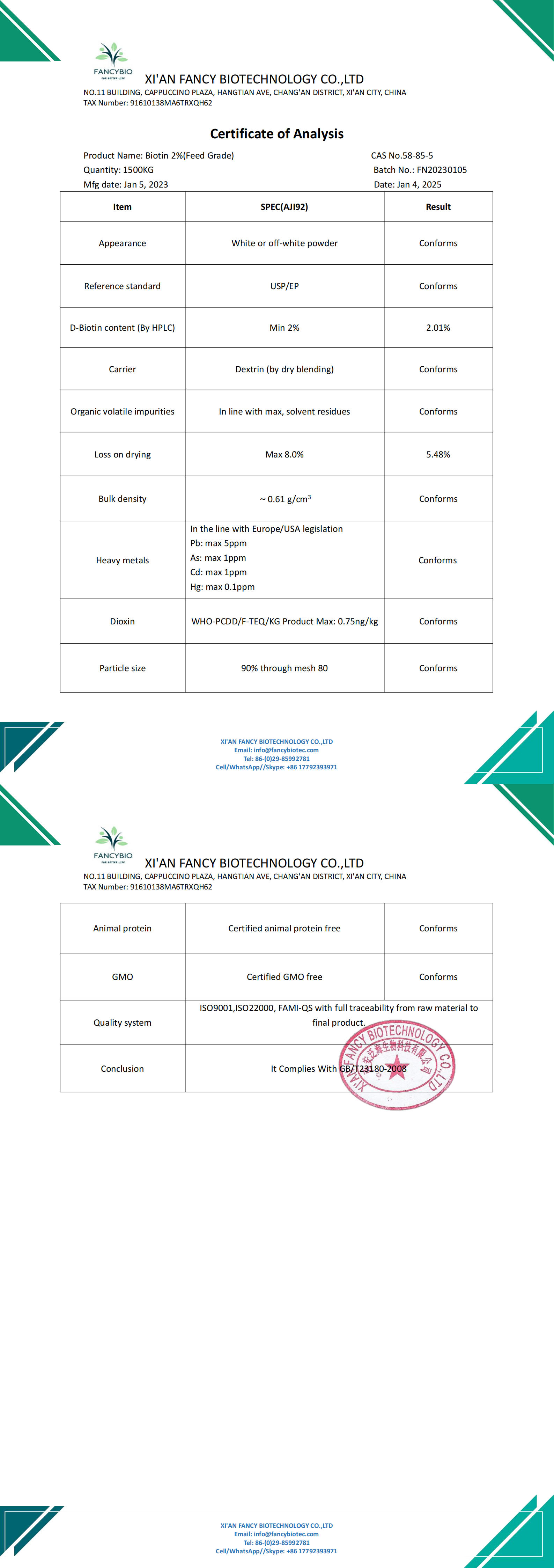D-Biotin is a water-soluble vitamin (vitamin B7) that plays a key role in human metabolism, particularly in the metabolism of fats, proteins and carbohydrates.


Vitamin B7(D-Biotin) CAS#58-85-5
D-Biotin is a water-soluble vitamin (vitamin B7) that plays a key role in human metabolism, particularly in the metabolism of fats, proteins and carbohydrates.
D-biotin, also known as vitamin H or vitamin B7, is an important water-soluble vitamin. It usually appears as a white or off-white crystalline powder with a light texture, easily soluble in water, and usually odorless but slightly bitter. It plays a crucial role in supporting the health of skin, hair, and nails, as well as in energy metabolism by acting as a coenzyme in the breakdown of fats, carbohydrates, and proteins. Biotin is also essential for maintaining healthy nervous system function and regulating gene expression.
Functions and Applications:
1.Metabolism: Biotin is a coenzyme involved in the metabolism of carbohydrates, fats, and proteins. It helps enzymes break down these macronutrients into forms that the body can use for energy production.
2.Hair, Skin, and Nail Health: Biotin is often associated with promoting healthy hair, skin, and nails. It is involved in the production of keratin, a protein that forms the structural foundation of these tissues. While biotin deficiency is rare, it can lead to symptoms such as hair loss, skin rash, and brittle nails.
3.Cell Growth and Repair: Biotin plays a role in cell growth and repair processes. It is necessary for the synthesis of fatty acids, which are essential components of cell membranes and play a role in cell signaling and inflammation.
4.Gene Regulation: Biotin is involved in the regulation of gene expression. It affects the activity of certain genes involved in metabolic pathways, cell proliferation, and differentiation.
5.Maintaining Blood Sugar Levels: Biotin may help regulate blood sugar levels by enhancing the activity of enzymes involved in glucose metabolism. Some research suggests that biotin supplementation may improve glucose tolerance in individuals with type 2 diabetes.
6.Pregnancy and Fetal Development: Adequate biotin levels are crucial during pregnancy for fetal development. Biotin deficiency during pregnancy can lead to birth defects, although such cases are rare.
7.Neurological Function: Biotin is involved in the synthesis of neurotransmitters, such as serotonin, which play a role in mood regulation and cognitive function. Some studies suggest that biotin supplementation may have a positive impact on certain neurological conditions, although more research is needed in this area.

Our professional sales team are waiting for your consultation.